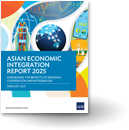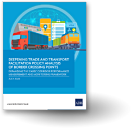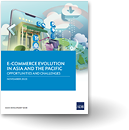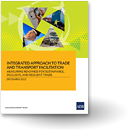ADB Virtual Inception Workshop on Trade, Investment, and Climate Change in Asia
While trade and investment have been critical to the development story of Asia and the Pacific, they have also come with environmental costs. Traded products embody carbon content in its production, which are often produced in developing economies where environmental regulations are lax or energy sources are more carbon intensive and shipped over long distances. Foreign investors may also choose investment locations to circumvent the stricter environmental regulations in their home country. Yet, trade and investment can be channels for economies to enhance climate change mitigation and adaptation. Green and environment-related goods can support developing economies’ efforts toward generating clean and renewable energy. In addition, foreign investments bring cleaner technology and production processes that can reduce the emission intensity of production. This inception workshop for the Asian Economic Integration Report 2023 theme chapter will gather international and ADB experts to exchange views, experiences, and perspectives on how trade and investment contribute to climate change and what can be done to mitigate it. The workshop will also examine how finance can support trade and investment in reducing its impact on climate change.
Event details
By Invitation
Date/Venue:
- 2:30pm–4:45pm
Wednesday, 2 March 2022 - 1:30pm–3:45pm
Thursday, 3 March 2022 - 9:30am–11:45am
Friday, 4 March 2022 - Manila Time, GMT +8
Online meeting via MS TEAMS
Contact:
-
- Pia Asuncion P. Tenchavez
Senior Operations Assistant, Economic Research and Regional Cooperation Department,
Asian Development Bank
Email: ptenchavez@adb.org
- Pia Asuncion P. Tenchavez
Download:

Opening Session
2:30–2:35 pm - Welcome Remarks:
 Albert Park Chief Economist and Director General, Economic Research and Regional Cooperation Department (ERCD), ADBBio
Albert Park Chief Economist and Director General, Economic Research and Regional Cooperation Department (ERCD), ADBBioAlbert Park is Chief Economist of the Asian Development Bank (ADB) and Director General of its Economic Research and Regional Cooperation Department. He is chief spokesperson on economic and development trends and leads the production of ADB’s flagship knowledge products and support for regional cooperation fora.
Mr. Park has more than 2 decades of experience as a development economist. A well-known expert on the economy of the People’s Republic of China, he has directed a number of largescale research projects in the country. He has also served as an international consultant for the World Bank and a member of the steering committee for the Asia-Pacific Research Universities’ Population Ageing Hub. Mr. Park has worked on a broad range of development issues including poverty and inequality, intergenerational mobility, microfinance, migration and labor markets, the future of work, and foreign investment.
Mr. Park is Chair Professor of Economics and Director of the Center for Economic Policy at HKUST (on leave). Previously, he served as a founding director of HKUST’s Institute for Emerging Market Studies, professor at the University of Oxford, and associate professor at the University of Michigan. He has also held editorial positions at a number of leading economic journals.
A national of the United States, he received his bachelor’s degree in economics from Harvard University and his doctorate in applied economics from Stanford University.
2:35–2:45 pm Overview of Research Project Shawn Tan Senior Economist, Regional Cooperation and Integration Division (ERCI), ADBBio
Shawn Tan Senior Economist, Regional Cooperation and Integration Division (ERCI), ADBBioShawn Tan is senior economist at the Economic Research and Cooperation Department of the Asian Development Bank (ADB). He is a seasoned economist with broad knowledge and expertise on economic policy and international development. He joined ADB in late 2021 after spending eight years at the World Bank, where he led and participated in many investment projects and policy reports on international trade and competitiveness topics in Vietnam, the Western Balkans and Eastern European countries, Kazakhstan, Turkey and Georgia. Prior to the World Bank, he worked in the Singapore Government, where he was a trade negotiator for Singapore’s trade and investment agreements and support multinational companies in Singapore on trade facilitation issues. He holds a Ph.D. in Economics and a Bachelor of Commerce (Honors) from the University of Melbourne, and a Master of Social Science from the National University of Singapore. His research interests are broadly in international trade, economic geography, and firm productivity and performance. He has published research articles in academic journals such as Journal of Development Economics and Small Business Economics, and his full portfolio can be found here.

Session 1: Impacts of Trade and Investment on Climate Change
2:45–2:50 pm - Introduction
 Shawn Tan Senior Economist, Regional Cooperation and Integration Division (ERCI), ADBBio
Shawn Tan Senior Economist, Regional Cooperation and Integration Division (ERCI), ADBBioShawn Tan is senior economist at the Economic Research and Cooperation Department of the Asian Development Bank (ADB). He is a seasoned economist with broad knowledge and expertise on economic policy and international development. He joined ADB in late 2021 after spending eight years at the World Bank, where he led and participated in many investment projects and policy reports on international trade and competitiveness topics in Vietnam, the Western Balkans and Eastern European countries, Kazakhstan, Turkey and Georgia. Prior to the World Bank, he worked in the Singapore Government, where he was a trade negotiator for Singapore’s trade and investment agreements and support multinational companies in Singapore on trade facilitation issues. He holds a Ph.D. in Economics and a Bachelor of Commerce (Honors) from the University of Melbourne, and a Master of Social Science from the National University of Singapore. His research interests are broadly in international trade, economic geography, and firm productivity and performance. He has published research articles in academic journals such as Journal of Development Economics and Small Business Economics, and his full portfolio can be found here.
2:50–3:15 pm Carbon Content of Trade Norihiko Yamano Economist, Organisation for Economic Co-operation and Development (OECD)Bio
Norihiko Yamano Economist, Organisation for Economic Co-operation and Development (OECD)BioNorihiko Yamano is an economist in OECD’s Directorate for Science, Technology and Innovation. He joined the OECD to work on developing harmonized national Input-Output tables and has led the work on the construction of the Inter-Country Input-Output (ICIO) database at OECD. He has played a key role in using ICIO tables to generate various, widely used, headline indicators such as trade in value-added (TiVA), carbon footprints, trade in employment and other indicators and analysis related to globalization. He has served various external Input-Output and bilateral trade-related projects including the expansion of TiVA/ICIO database for Asian development economies, APEC, Europe, Latin America and Africa as a consortium member or as an external advisor. Council member (Jan 2020-) and Vice-president (Jan 2022- ) of the International Input-Output Association.
3:15–3:40 pm Foreign Direct Investment and Pollution Offshoring Robert Elliott Professor, University of BirminghamBio
Robert Elliott Professor, University of BirminghamBioRobert Elliott is an applied economist who works at the intersection of international economics, development economics, environmental and energy economics. He has a particular interest in the Chinese economy, firm behaviour, natural disasters and the impact of globalisation on the environment. He is an editor for the Sustainable Future Policy Lab, Environment and Resource Economics, a Director of the Trade, Environment, Development and Energy (TEDE) research group, a member of Water Challenges in a Changing World IGI and an Affiliate of the Lloyds Bank Centre for Responsible Business. He has published over 75 articles including papers in Journal of Environmental Economics and Management, Journal of Development Economics, Energy Economics. Environmental and Resource Economics and many more. He has done consultancy for the World Bank and the European Commission.
3:40–3:50 pm Coffee Break3:50–4:15 pm Greenhouse Gas (GHG) Emissionsin International Trade/Shipping Tristan Smith Reader, University College LondonBio
Tristan Smith Reader, University College LondonBioTristan Smith, Associate Professor in Energy and Transport at UCL and PI of the Decarbonising UK Freight Network Plus project has, since 2010, grown a substantial group focused on modeling and analysis of shipping’s efficiency and emissions. He was PI of the RCUK funded Shipping in Changing Climates project, led the 3rd IMO GHG Study, is an author in the 4th IMO GHG Study, is lead author of ISO 19030, co-chair of World Bank’s CPLC Maritime Thread, and has been involved in numerous projects across the academic, industry and policy domains. The group maintains a number of models including GloTraM, which is used by several multinationals to explore shipping’s future scenarios and technology evolution. He is co-founder of University Maritime Advisory Services (UMAS).
4:15–4:45 pm Open Discussion
Day 2: Thursday, 3 March 2022
Session 2: Recent Developments on Trade, Investment, and Finance to Address Climate Change
1:30–1:35 pm - Introduction
 Rolando Avendano Economist, ERCI, ADBBio
Rolando Avendano Economist, ERCI, ADBBioRolando Avendano is an Economist at the Economic Research and Cooperation Department of the Asian Development Bank. His research focuses on financial and international economics, with an emphasis on regional integration, competitiveness and foreign direct investment. Prior to joining ADB, he worked for the Organisation for Economic Co-operation and Development (OECD) in Paris, France. He was partnership coordinator of PARIS21 (OECD Statistics and Data Directorate), economist with the Director’s Office and the Americas Desk (OECD Development Centre), and research associate with the OECD Trade Directorate and Economics Department. Previously, he was a lecturer at the Engineering Faculty of University of Los Andes (Colombia), and research associate at University College London (UK). A French and Colombian national, he holds a B.Sc. in Industrial Engineering from University of Los Andes and a Master and PhD in Economics from the Paris School of Economics (PSE).
1:35–2:00 pm Climate-Smart Trade and Trade Facilitation Yann Duval Chief, Trade Policy and Facilitation Section, United Nations Economic and Social Commission for Asia and the Pacific (UNESCAP)Bio
Yann Duval Chief, Trade Policy and Facilitation Section, United Nations Economic and Social Commission for Asia and the Pacific (UNESCAP)BioYann Duval is currently Chief of Trade Policy and Facilitation Section at UN-ESCAP, the regional branch of the United Nations Secretariat for Asia and the Pacific. Over the past 20 years, Dr. Duval has conducted research and delivered technical assistance and advisory services on trade policy and facilitation throughout Asia and the Pacific, including on the WTO Trade Facilitation Agreement. He spearheaded the development of the Asia-Pacific Research and Training Network on Trade (ARTNeT), as well as, interalia, the creation of the ESCAP-World Bank Trade Cost Database, the UN Global Survey on Trade Facilitation and Paperless Trade Implementation and the online Trade Intelligence and Negotiation Adviser (TINA). Dr. Duval was also instrumental in the development of the United Nations Network of Experts for Paperless Trade and Transport in Asia and the Pacific (UNNExT) and the negotiation of a new intergovernmental Framework Agreement on Facilitation of Cross-Border Paperless Trade in Asia and the Pacific, a UN treaty entered into force in February 2021. Prior to joining the UN, he held faculty positions at the Asian Institute of Technology and Washington State University, USA.
2:00–2:25 pm Environmental Goods: What are They and How to Support Them? Emma Aisbett Fellow, School of Regulation and Global Governance and Associate Director, Research, Zero-Carbon Energy for the Asia-Pacific Grand Challenge, Australia National UniversityBio
Emma Aisbett Fellow, School of Regulation and Global Governance and Associate Director, Research, Zero-Carbon Energy for the Asia-Pacific Grand Challenge, Australia National UniversityBioEmma Aisbett a Fellow at the School of Regulation and Global Governance (RegNet) and Associate Director (Research) for the Zero-Carbon Energy for the Asia Pacific Grand Challenge at the Australian National University. Emma has degrees in Chemical Engineering (UNSW), Environmental Management (Oxford) and Economics (UC Berkeley). She combines her interdisciplinary understanding with extensive government and industry engagement to develop solutions to problems at the intersection of international economic regulation and the environment. Her work on international investment agreements has been published in leading journals in political science, economics and international law, and she has been an invited expert on the topic at both the OECD and the United Nations Commission on Trade and Development. Her current research explores how to make Trade & Investment Policy and Green Industrial Policy mutually supportive of each other, and of the net-zero transition. She is currently collaborating with the Australian Government and the World Bank, researching trade-related climate policies including hydrogen/ammonia certification and embedded emissions accounting frameworks.
2:25–2:30 pm Coffee Break2:30–2:55 pm Greening Businesses: Challenges and Opportunities for Scaling Up Green Business Investments in Asia Isao Endo Environmental Specialist, Sustainable Development and Climate Change Department (SDCC), ADBBio
Isao Endo Environmental Specialist, Sustainable Development and Climate Change Department (SDCC), ADBBioIsao Endo is Environment Specialist working on natural resource management at the Asian Development Bank (ADB). He manages technical assistance to promote natural capital investments with a focus on nature-based solutions, supporting ADB’s operation to integrate these innovative approaches into project design. He holds the bachelor’s degree in economics from Sophia University and the master’s degree in environmental management from Yale University.
2:55–3:20 pm Aligning Finance with the Climate Goals Ulrich Volz Professor, SOAS University of LondonBio
Ulrich Volz Professor, SOAS University of LondonBioUlrich Volz is Professor of Economics and Director of the Centre for Sustainable Finance at SOAS University of London. He is also a Senior Research Fellow at the German Development Institute and Honorary Professor of Economics at the University of Leipzig. At SOAS, he previously served as Head of the Department of Economics and Member of the University’s Executive Board. Ulrich is a director of the Global Research Alliance for Sustainable Finance and Investment and serves on the advisory panel of the Glasgow Financial Alliance for Net Zero (GFANZ) and the advisory committee for the Climate/SDGs Debt Swap Mechanism of the UN Economic and Social Commission for Western Asia. He is a member of the NGFS-INSPIRE Study Group on Biodiversity and Financial Stability and of the World Bank’s Green Recovery Monitoring and Evaluation Technical Working Group. Ulrich was Banque de France Chair at EHESS in Paris, and also taught at Peking University, Kobe University, Hertie School of Governance, Freie Universität Berlin, Central University of Finance and Economics in Beijing, and the Institute of Developing Economies in Tokyo. He spent stints working at the European Central Bank and the European Bank for Reconstruction and Development and held visiting positions at the University of Oxford, University of Birmingham, ECB, Bank Indonesia, and Aoyama Gakuin University in Tokyo. Ulrich was part of the UN Inquiry into the Design of a Sustainable Financial System and has acted as an advisor to several governments, central banks, international organisations and development agencies on matters of macroeconomic policy, sustainable finance and development. Ulrich was lead author of a recent study on ‘Climate Change and Sovereign Risk’ as well as a 2018 UN report on ‘Climate Change and the Cost of Capital in Developing Countries’. He has written two books and more than 40 articles in peer-reviewed journals, and edited six books, most recently the ‘Routledge Handbook of Banking and Finance in Asia’, and an NGFS volume on ‘Case Studies of Environmental Risk Analysis Methodologies’.
3:20–3:45 pm Open Discussion
Day 3: Friday, 4 March 2022
Session 3: International Cooperation and Policy Responses to Tackle Climate Change
9:30–9:35 am - Introduction
 Rogelio Mercado Economist, ERCI, ADBBio
Rogelio Mercado Economist, ERCI, ADBBioRogelio Mercado is an economist at the Regional Cooperation and Integration Division of the Economic Research and Regional Cooperation Department of ADB. He contributes to various division publications and knowledge products. His research interests include capital flows, financial integration, financial stress, portfolio allocation, asset price discovery, financial inclusion, and economic convergence. Rogelio has published in international journals including Journal of Banking and Finance, Journal of International Money and Finance, Journal of Futures Markets, Review of Income and Wealth, and co-authored several book chapters.
Prior to joining the ADB in July 2020, he was a senior economist at the South East Asian Central Banks Research and Training Centre where he developed and delivered training courses on macroeconomics and monetary policy and led the publication of the SEACEN Capital Flows Monitor. He was a lecturer in economics at Newcastle Business School, after completing his PhD in economics from Trinity College Dublin. Rogelio previously worked at the National Economic and Development Authority, Bangko Sentral ng Pilipinas, De La Salle University, and Ateneo de Manila University.
9:35–10:00 am Sustainable Finance and Financing Instruments: Progress, Performance, and Policies Torsten Ehlers Senior Economist, Bank for International SettlementsBio
Torsten Ehlers Senior Economist, Bank for International SettlementsBioTorsten Ehlers is a Senior Financial Sector Expert at the IMF’s Monetary and Capital Markets department in Washington DC since September 2021. He is seconded from the Bank for International Settlements, where he has been working for 10 years both at the headquarters in Basel and its representative office in Hong Kong. He has worked extensively on green bond markets and has been a member of various workstreams of the Network of Central Banks and Supervisors for Greening the Financial System as well as the G20 Sustainable Finance Working Group. His research interests include sustainable finance, international banking, dollar funding and derivative markets. He holds a PhD in Economics from the University of Zurich, Switzerland, a Masters in Economics from Warwick University, UK, and a Masters in Business Administration from the University of Dortmund, Germany.
10:00–10:25 am Carbon Border Adjustments Mechanism and its Impacts on Developing Countries Aaron Cosbey Senior Associate, International Institute of Sustainable DevelopmentBio
Aaron Cosbey Senior Associate, International Institute of Sustainable DevelopmentBioAaron Cosbey is a development economist with 30 years’ experience in the law and economics of sustainable development, particularly in the areas of trade and investment, with current work in the areas of climate change, trade policy, and green industrial policy. He is a Senior Associate with the International Institute for Sustainable Development, a Senior Fellow with the European Roundtable on Climate Change and Sustainable Transition, a Senior Associate with the Inter-Governmental Forum on Mining, Minerals, Metals and Sustainable Development, and a Consulting Advisor to Agora Industry.
He has served as a trade policy advisor to the Canadian government on a number of select trade policy committees. He has consulted to a wide variety of governments and institutions, including Agora Energiewende, the Canadian Department of Foreign Affairs and International Trade, Centre for European Policy Studies, CIDA, Centre for International Governance Innovation, Commonwealth Secretariat, Environment Canada, European University Institute, IADB, Canada’s National Round Table on Environment and Economy, New Zealand’s Parliamentary Commissioner for the Environment, North American Commission for Environmental Cooperation, Overseas Development Institute, OECD, UNCTAD, UNDP, UNEP, UNFCCC and the World Bank.
10:25–10:50 am Greening Trade and Investment Policies Emma Aisbett Fellow, School of Regulation and Global Governance and Associate Director, Research, Zero-Carbon Energy for the Asia-Pacific Grand Challenge, Australia National UniversityBio
Emma Aisbett Fellow, School of Regulation and Global Governance and Associate Director, Research, Zero-Carbon Energy for the Asia-Pacific Grand Challenge, Australia National UniversityBioEmma Aisbett a Fellow at the School of Regulation and Global Governance (RegNet) and Associate Director (Research) for the Zero-Carbon Energy for the Asia Pacific Grand Challenge at the Australian National University. Emma has degrees in Chemical Engineering (UNSW), Environmental Management (Oxford) and Economics (UC Berkeley). She combines her interdisciplinary understanding with extensive government and industry engagement to develop solutions to problems at the intersection of international economic regulation and the environment. Her work on international investment agreements has been published in leading journals in political science, economics and international law, and she has been an invited expert on the topic at both the OECD and the United Nations Commission on Trade and Development. Her current research explores how to make Trade & Investment Policy and Green Industrial Policy mutually supportive of each other, and of the net-zero transition. She is currently collaborating with the Australian Government and the World Bank, researching trade-related climate policies including hydrogen/ammonia certification and embedded emissions accounting frameworks.
10:50–11:15 am Carbon Markets in Asia Virender Kumar Duggal Principal Climate Change Specialist, SDCC, ADBBio
Virender Kumar Duggal Principal Climate Change Specialist, SDCC, ADBBioVirender Kumar Duggal leads ADB’s work to support its developing member countries (DMC) use carbon pricing instruments as part of their broader climate policy architecture to achieve their nationally determined contributions (NDCs) and contribute to meeting the Paris Agreement goals. In this role, he spearheads ADB’s trust funds that mobilize carbon finance to incentivize investments in low carbon technologies through bilateral and international carbon markets. He also oversees ADB’s work on providing technical and capacity building support to enhance DMCs’ ability to develop and take advantage of domestic, bilateral, and international carbon markets, and, where applicable, integrated markets to scale up their efforts in achieving their NDC targets and raising ambition over time.
11:15–11:45 am Open Discussion




